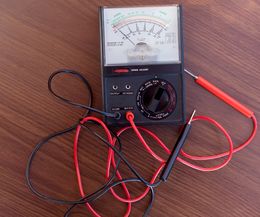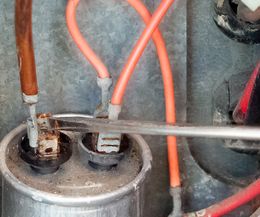Air Conditioning Capacitor – Detect and Repair AC Capacitor
Common A/C Repair – Replacing Your Air Conditioning Capacitor
Air conditioning capacitor problems are easy to detect, test and repair. However, replacing your Heat Pump or AC capacitor is also a risky task. Capacitors store power, and even though the breakers to the heating and cooling unit are tripped and the flow of electric current through the system is disabled, a capacitor retains the power to light up your world. Two rules for dealing with A/C capacitors or any other electric motor starting capacitor:
- Disconnect the unit power source
- Discharge the capacitor.
Working with electricity can be detrimental to your health. Before touching anything inside the cover of your heating and cooling equipment, know exactly what you are doing.
Coming into simultaneous contact with two of the terminals on an air conditioning capacitor makes for dangerous discharge of electricity. Furthermore: trashing a capacitor that has not been properly discharged creates a fire hazard. Likewise, avoid placing a charged capacitor on dry grass, paper or any other combustible materials. To discharge the stored current from within an A/C or heat pump capacitor, disengage the power source and then use an insulated screwdriver to short across the terminals of the capacitor (figure 1).
Hot Day In Arizona – What To Do When The Air Conditioning Capacitor Quits
When your A/C stops working, even summer fun becomes a drag. It’s hot, sweaty and nasty inside and out. Furthermore, HVAC repairs can get rather expensive. This article may help you get cool while also saving a few dollars on the repair costs. But remember: Messing with electric components is risky. Take care that you fully understand this guide and the associated warnings.
Checking The A/C or Heat Pump Capacitor Multimeter Style
Capacitors store electric charge and are used to maintain voltage supply and/or boost torque during device startup. HVAC systems use capacitors for both purposes. By sight and sound alone, you can make several good guesses concerning the condition of your air conditioning capacitor. However, for the final test, technicians use a multimeter (image 2). If you do know how to use a multimeter or a voltmeter, give up now and call your Arizona Air Conditioning service center. You are likely already in over your head.
To run a multimeter test on your HVAC capacitor: 
- Disconnect the unit power source
- Discharge the capacitor
- Mark for location and then disconnect the wires from the capacitor’s terminals
- Place the leads from the multimeter on the terminals, one to each terminal
- The reading should be within six percent of the rating for that make and model of capacitor.
Checking The HP or A/C Capacitor Using Sight And Sound
Ok. Perhaps you aren’t ready to actually repair capacitor on your HVAC equipment, but you still want to get an idea of the problem. That’s good. It helps you make an informed price comparison. To check your unit via sight and sound, just stand near the condensing unit and listen for a humming sound while noticing if the fan is spinning or not spinning. Hum without spin likely means air conditioning capacitor problems.
A Capacitor Test That Does Not Require Use of a Multimeter
Since the A/C capacitor is designed to boost power during the system startup, it makes sense that you can provide the necessary assistance. The process is simple. If the outside A/C condensing unit is humming but the fan is not responding, you need to give the fan a kick-start. Find a long stick that will slip through the fan guard. Use something that will bend or break should the fan start turning before you get it out of the way. Now, slide the tool through the fan guard and then gently nudge one of the fan blades. It things crank up and keep going, place bets on the problem being a bad A/C start capacitor.
Bad Capacitor Sight Test Two
If you have already removed the service panel from your condensing unit, do a visual inspection of the capacitor. If the top of the component is swollen out, the capacitor is likely blown.
Choosing The Correct Replacement Component
Two points: Record both the voltage rating and the micro-farads (μF) of your current capacitor. Brand name doesn’t matter and neither (within reasonable limits) does shape and size. The existing A/C capacitor mounting brackets are typically flexible enough to accommodate various sizes and shapes. Even the component voltage voltage rating has some room for upward adjustment. However, the micro-farads (μF) must be an exact match from old to new.
As to pricing, Arizona residential HVAC units are reasonably sized and the capacitor is typically fairly cheap. For example: Pricing for the average Amana, Goodman, Rheem or Trane residential air conditioning capacitor will come in at $35.00 or less. But if all this seems a mite confusing or if messing with electrical components goes against your grain, Arizona-based American Cooling and Heating is ready, 24/7, to service your home or office HVAC equipment. And ACH prices are more than reasonable.
A/C capacitor, Air Conditioning Capacitor, Heat Pump
